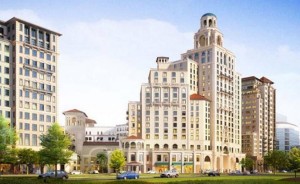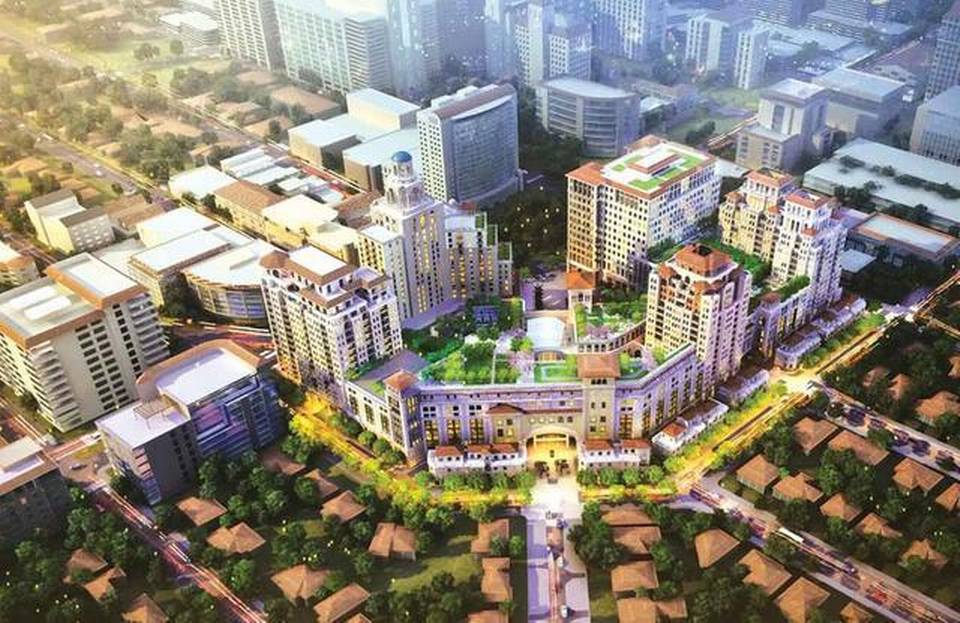- Have any questions?
- 305-912-PILE (7453)
- estimate@flfoundations.com
Massive Coral Gables mixed-use project refined; wins preliminary approval
After nearly eight hours of discussion, Coral Gables is closer to approving its biggest development project ever.
On first reading Thursday, city commissioners gave preliminary approval to an updated version of the Mediterranean Village project — a controversial mixed-use deal that has developers, politicians and residents on their toes.
Developers will move forward with the project and are set to come back at second reading after city officials asked them to revise some additional concerns.
If passed on second reading, the massive $500 million plan developed by Agave Ponce LLC would include a high-end hotel, 300,000 feet of office space, restaurants, retail establishments and a gym. It’s also slated to include 214 condo units and 15 townhouses.
City officials pushed to have developers scrap the originally proposed cinema and a residential tower, reduce the size to about 1.1 million square feet, and redesign the hotel so that the entrance is on Galiano Street, not on Ponce de Leon Boulevard, derailing major traffic.
The refined plan is about 200,000 square feet less than the original proposal. It was also reduced by in height from 218 feet of habitable space to 190, meeting the city’s code.
The mixed-use venture would rise on the former Old Spanish Village site on Ponce Circle, just a few blocks south of Miracle Mile.
Commissioners were originally scheduled to vote on the project March 25 during their regular meeting. However, as it dragged on for more than five hours, officials asked developers to tweak their proposal based on city officials’ and residents’ concerns, and come back on April 2 for the vote.
Concerns raised included traffic, parking, public safety, sustainability, trolleys, residential life, neighborhood impact and open spaces.
At the end, developers tweaked their proposal and promised:
▪ Eliminate second floor of retail and reorient toward Ponce de Leon Boulevard and eliminate all glass roofs over rights of way.
▪ A proposed traffic-flow design approved by Miami-Dade County before second reading.
▪ Valet drop-off area.
▪ Extend trolley schedules and stopping points.
▪ Parking garage design improvements.
▪ Bicycle friendly roads.
▪ Conceptual parking management plan for employees.
▪ Shared parking plan.
▪ Increase in residential parking zones.
▪ Require all buildings to be LEED (Leadership in Energy & Environmental Design) certified.
▪ Adequate loading zones.
But the commissioners still weren’t content.
Commissioner Patricia Keon said she wasn’t happy about having so much retail space and a cinema so close to homes.
She added that it compromises future residents’ security and privacy, and that she doesn’t want Miracle Mile to suffer from future competition.
“I don’t want people to visit a project, I want them to visit downtown Coral Gables,” she said, noting that she would like the project to have more “walkable urban space.”
Developers were quick to ease her concerns and proposed eliminating the cinema and increase green space on the ground floor. They also said Agave would bring in “high-quality retailers that wouldn’t compete with retailers on the Mile.”
Commissioners said they feared the project would take away attention from Miracle Mile, the center and staple of Coral Gables.
Developers said their vision of Mediterranean Village would be connecting the two, creating a walkable destination that would bring in revenue from both the Village and the Mile and “resurrect Ponce de Leon to its very strong retail core.”
Commissioners also stressed wanting to see a deeper transition from commercial and residential areas, including the proposed hotel and retailer on the ground floor.
“This has to promote people’s safety and privacy. I don’t think residential units on top of a mall does that,” Keon said.
Commissioner Bill Kerdyk said he was concerned about the structures’ scale and height.
“It exceeds our tallest building by 18 feet. Right now our tallest building is 218 feet,” Kerdyk said. “This is something I have to feel better about before I support this project. Intensity has been a problem of mine ever since I saw the project three years ago. I recognize the commitment of the developer but I also understand the impact of the community.”
Commissioner Vince Lago agreed.
Developers then proposed making the hotel tower, the only structure of the project to go above the 190 foot of habitable zoning code limit. The residential and office buildings will be reduced, meeting the 190 foot maximum.
Agave has been in talks with the city of Coral Gables for more than three years, with several versions of the project being amended and transformed.
The Mediterranean Village project has become part of the political platforms of those running for city commission on April 14. Some candidates think the immense project will be an asset to the City Beautiful, while others are more hesitant about it, believing it would impact neighborhood and residential life.
Former Commissioner and current mayoral candidate Ralph Cabrera has called out his opponent Mayor Jim Cason for accepting thousands of dollars in contributions from companies affiliated to Agave, the developer overseeing the Mediterranean Village project. He called the move a conflict of interest.
Cason defended himself saying he has no problem being impartial.
The Mediterranean Village has been a leading topic at every recent election forum.
If the the project comes to pass, the city would have to hire four more police officers, an annual cost of $372,156, according to a memo from the police department to the city manager’s office.
The fire department would also need to hire six firefighters and a life safety fire Inspector, promote three firefighters to lieutenants, and purchase a fully serviceable and staffed firetruck that would need to be inspected.
The city would also need to add a minimum of six intersections with an emergency vehicle preemption system with about 22 emergency vehicle installations — a total of $800,580, according to a memo from the fire department to the city manager’s office.
About $37 million in neighborhood improvements, street upgrades, subsidizing trolleys, and landscape connection improvements will be contributed to the city by the developer: $1.3 million upfront to purchase four trolleys; $626,000 to be contributed every year for 25 years for maintenance.
More than six hours of discussion later, Lago asked the commission to come to an accord.
“It’s either hay or nay, they can’t massage this any more,” Lago said.
On Feb. 11, the Coral Gables Planning and Zoning Board unanimously approved the Mediterranean Village project. It will go for second reading in at least 40 days before the city commission. The project would rise about three to five years after its probable final approval. Developers will meet with staff and commissioners will be briefed on the process by the city attorney.

***** *****
Story by: Monique O. Madan – 04/02/2015 5:41 PM | Updated: 04/03/2015 10:37 AM
Photo Courtesy: AGAVE, LLC

